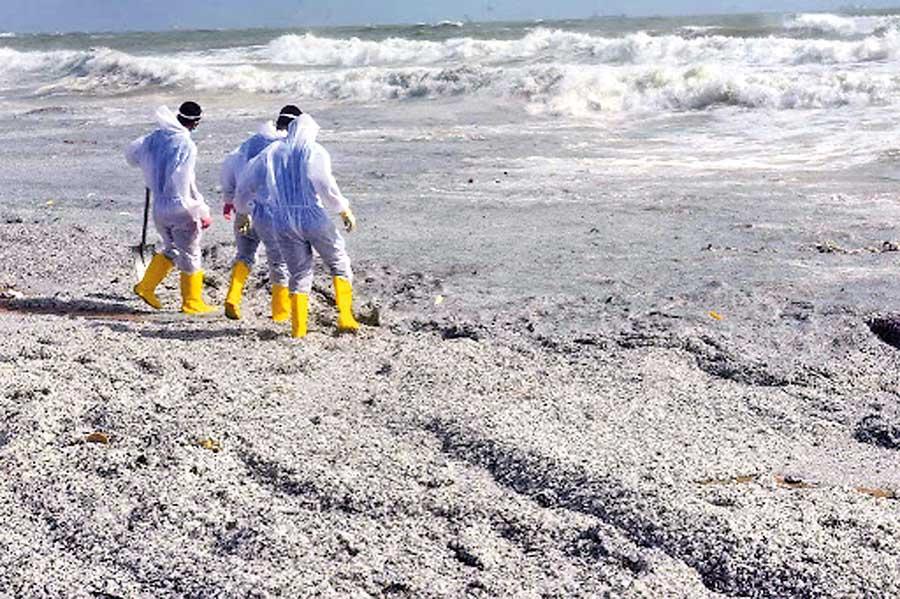14 Jun 2021 - {{hitsCtrl.values.hits}}

A step further from last week’s second to last of trilogy in “Dollar series”— “Good, Bad & Ugly”. Watch!—is there any plastic around you; yogurt containers, water bottles, bags? Most of them do not make it to the recycling unit, or the landfill. This plastic—carried by waterways, rivers, and wind, will find its way to the Ocean, then convert into micro-plastics [ocean surge and ultraviolet light will accelerate the breakdown] which is easily mistaken by small fish and plankton, [it is novel to them] and to the bigger fish through a process known as ‘bio-magnification’, that finally end up in the chain’s last link--your tummy through platter at sea-food outlet.
any plastic around you; yogurt containers, water bottles, bags? Most of them do not make it to the recycling unit, or the landfill. This plastic—carried by waterways, rivers, and wind, will find its way to the Ocean, then convert into micro-plastics [ocean surge and ultraviolet light will accelerate the breakdown] which is easily mistaken by small fish and plankton, [it is novel to them] and to the bigger fish through a process known as ‘bio-magnification’, that finally end up in the chain’s last link--your tummy through platter at sea-food outlet.
The Good—relative to the magnitude of the disaster, comparatively less life lost: however, the Bad—dead marine life and debris washed up on shores during the past few days. The Ugly— face the devastating blow of this adversity for decades to come?
The International Tanker Owners Pollution Federation (ITOPF) and Board Members of Oil Spill Response Limited (OSRL) are the ship owners and insurance companies. Our Marine Environment is administered and governed by the Agency named The ‘Marine Environment Protection Authority’, [MEPA]. It should be technically MEPA that should make decisions on what institutions or organisations are to be called in to carry the continuing efforts? ITOPF, they say, is at regular readiness to act in response to spills in the world and is on the dot in an incident to offer advice and assistance on pollution damage assessment and cleanup operations. ITOPF is financed by over 6100 tanker owners and associates who operate about 10,800 tankers, barges, and carriers. They Advice in relation to consequential damage to coral reefs, and say it remains committed to sponsor effective response to spills of chemicals, oil, and other hazardous material.
"Consequential awful pollution by human initiated destruction forcing many species near extinction. For the sake of, especially our future generations, we should seek to institute support legislation and promote the protection of wildlife"
Oil Spill Response Limited is a British company focused on managing oil disasters. Its shareholders are major oil companies [well over two thirds of the world’s] who co-financed its services and funded by contributions of its 44 stakeholders. They boast of having a diverse portfolio of men who are skilled and experienced to assist the members during a spill using Incident Management System (IMS) structures.
Are we going to use them, if so, on what basis? For the tragedy caused by the inferno of X-Press Pearl, accepting the engagement of ITOPF and OSRL, the Government will be presented with a position similar to “horage ammagen pena ahanava”- [hiring as soothsayer, who happened to be the mother of the rogue himself] . Are they chosen to this particular matter by the owners of the ‘burning Pearl’? Both organizations are intended to guard the welfare of ship-owners and energy giants rather than the coastal belt and environment of poor Sri Lanka.
The Good—wonderful creatures of the ocean and stuff, magnificent corals; not everyone sees the deep-sea like this, found below its surface: the Bad—animal plunder and flawed fishing practices, the Ugly— consequential awful pollution by human initiated destruction forcing many species near extinction. For the sake of, especially our future generations, we should seek to institute support legislation and promote the protection of wildlife.
The Problem of plastic pollution defined
Plastic Pollution is the amassing and infiltration of man-made plastics into the atmosphere reaching a point when they inflict mayhem on ecosystems and the flora and fauna that inhabit them. Plastic pollution is extensive throughout the globe variety from the zenith of the highest peak, Mt. Everest 9 km, to the Mariana Trench 11 km, the deepest point in our oceans.
All rivers and waterways on all countries lead to the ocean. Annually these ‘highways’ carry 8.8 million MT of manmade plastic waste to oceans, Sri Lanka’s contribution is alarming [260,000 MT?-subject to correction] the crisis getting bad each year.
"Today, X-press Pearl is world’s hot news; environmentalists and foreign agencies around the globe are watching our waters through satellite images, and NARA and many Academic groups from our universities are actively working. An eye-opener, if we are to aim at becoming South Asia’s Maritime Hub, to be prepared, have systems, procedures in place; train rapid action teams and be proactive not reactive"
Well over 85% of all garbage in our oceans constitute of plastic. As many as 51 trillion micro-plastic particles litter our oceans annually as per a report presented recently at United Nations Marine Conference. This is more than 450 times the stars in our Milky Way galaxy; undoubtedly, it would seriously threaten marine life. Plastic does not break down like other organic throw away but convert into micro-plastics [ocean surge and ultraviolet light will accelerate the breakdown] which is easily mistaken by small fish and plankton, and from them to big fish caught for food for humans [animals haven’t evolved with plastics, which is only few decades old]. This allows plastics to travel up food chain, until they end up on your dinner platter in the favorite seafood restaurant ingesting carcinogenic pollutants in to your system.
Experts say there are five major ocean gyres. Multiple factors such as winds, currents, and planetary rotation add to predictable movements of sea pollution which end in a central concentration of trash. These are known as gyres, in which plastic debris is caught and can be found grouped in the center of these spin. These are areas of amassed plastic and create a secondary problem of broken down micro-plastics or a phenomenon called “ocean Slurpee” invisible to our eye. By 2040 if this plastic pollution continues at the same rate, there will be extra plastic in the ocean than marine life.
Oil spills and pelagic birds
The dangerous disasters are the large oil spills. This happen when pipelines rupture, big tanker ships sink, or due to errors in drilling operations. Following a large oil spill, ecosystem and economic consequences can be experienced for decades .
Oil is a prehistoric fossil fuel that we use to generate power and electricity. Unique and varied sea birds, also known as Pelagic birds, found hundreds or thousands of miles offshore that spends a major portion of its living on the open ocean, and rarely appearing on land to breed. Pelagic birds have some exceptional characteristics not found among other types. They are powerful fliers that can stay aloft gliding or soaring for hours; however, they do rarely land on the sea surface to rest or will drift briefly after hunting.
These birds, according to experts have an inherent habit of getting attracted to highly toxic natural ship fuel spills mistakenly identifying them as nutritious hydro-carbons emanated by huge carcasses of marine animals for which their sensory systems are programmed for attraction.
It takes advance technology to clean up the oil, assess the blow of pollution, and facilitate the ocean recover. Thousands of oil spills occur in five oceans each year: spills happen in many different ways. If they happen in sensitive environments they can cause damage especially to mangroves, beaches, and wetlands. Even the Americans did not possess expertise and wherewithal to effectively handle a huge oil spill until the largest marine spill in its history, ‘The Deepwater Horizon’ occurred on April 20, 2010. ‘Lessons learnt’ made Scientists to prepare advanced strategies for future spill disasters. The “Deep Water” spill happened when an explosion took place on its drilling platform in Mexico, releasing 134 million gallons of oil into the ocean. An estimated settlement of US$ 8 billion for restoration was reached in 2016, and the work is still continuing today.
The Good—today, X-press Pearl is world’s hot news; environmentalists and foreign agencies around the globe are watching our waters through satellite images, and NARA and many Academic groups from our universities are actively working. An eye-opener, if we are to aim at becoming South Asia’s Maritime Hub, to be prepared, have systems, procedures in place; train rapid action teams and be proactive not reactive. The bad is competition among top bureaucrats like in the Covid scene. The Ugly is politicians develop favourites among the bureaucrats and they think they know best, and do not seek the advice of experts.
First step - A culture depends on single-use plastics
It is the duty of every one to save 120-bottles annually when you switch to re-usable. Break up with bottled water. Save hundreds of dollars every year by looking for a low-cost reusable bottle, shop with re-usable bags. Over 120,000 marine flora and fauna are killed by plastic bags each year. Switch to re-usable to lessen your overall waste and keep marine life from destruction. You can save 900 plastic bags from getting gobbled by turtles. One can save 260 straws when you switch to re-usable; skip the straw. Do without it or if you like having something to sip with, use a glass, metal or other type of reusable straw. Say no to straw.
Watch the politician of all shades...
Kill boredom? Listen to amazing piece of Ennio Morricone’s “G,B & U” theme replayed by Danish National Symphony Orchestra on… https://www.youtube.com/watch?v=uxvD3CpB3l4
Author can be reached on: [email protected]
23 Oct 2024 42 minute ago
23 Oct 2024 2 hours ago
23 Oct 2024 4 hours ago
23 Oct 2024 6 hours ago
23 Oct 2024 7 hours ago